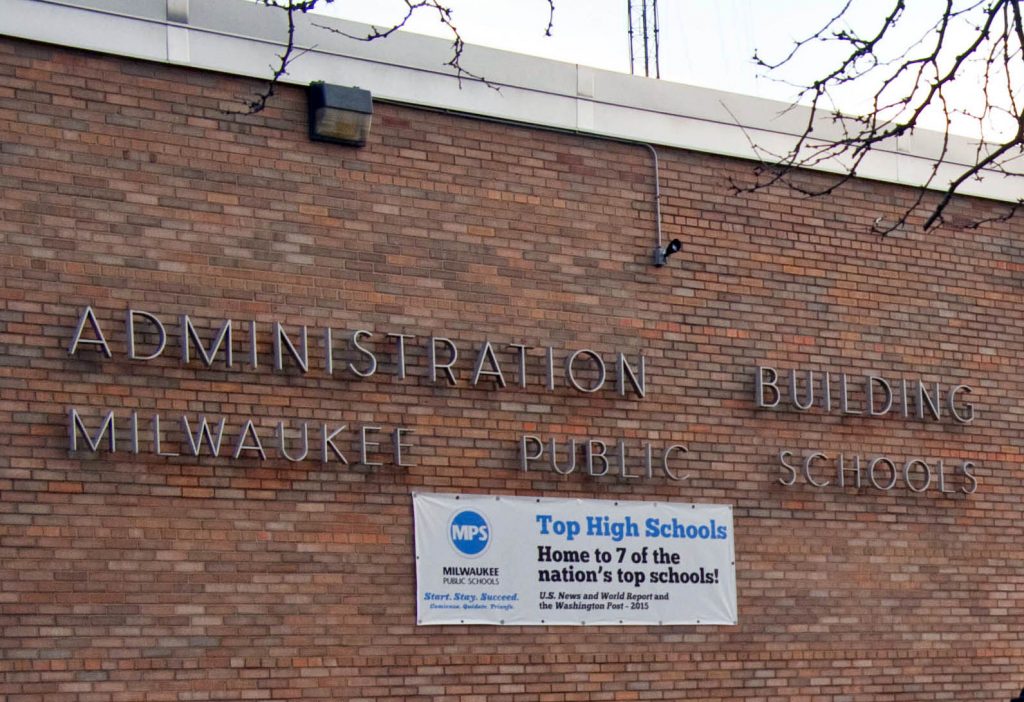MPS Failures Result In GOP-Called Audit of DPI
GOP-controlled committee moves to audit DPI practices, DNR fish and wildlife account.

Charles Edward Miller (CC-BY-SA)
The Wisconsin Legislature’s Joint Audit Committee ordered two audits on Thursday — one on how the state Department of Public Instruction’s analyses school district financial data and another to look into financial losses in the Department of Natural Resource’s fish and wildlife account.
Both audits were authorized on party-line votes with only Republican support.
Republicans on the committee voted to launch the DPI audit in reaction to the financial crisis at Milwaukee Public Schools after the district neglected to submit required financial documents to DPI on time. The severity of the situation came to public attention after DPI warned the district in May that state funding would be withheld if the necessary financial documents weren’t received.
Since then, the district has worked with DPI to develop a corrective action plan focused on getting the documents turned in and to address some of the potential causes of the problems. Gov. Tony Evers has also started two additional operational and instructional audits of the district that will be conducted by private auditors in addition to the ongoing financial audits.
At the hearing, committee co-chair Sen. Eric Wimberger (R-Green Bay) said the incident led to systemic questions: “What did DPI know and when, was information held back from public view to affect a referendum, and how does DPI track things and use discretion?” He accused DPI of deciding to “not to treat the infection it knew about at MPS and letting it fester until it was too late.”
Wimberger questioned DPI Deputy Superintendent Tom McCarthy about the timing of the decision to send a May letter to MPS warning about the tardy documents. McCarthy said his decision to send the letter had nothing to do with the district’s $252 million referendum question that was approved in April.
“I know that your brain says ‘Hey, this has got some nefarious reason that relates to their question and referenda,’” McCarthy said. “The real reason [is] we had to be certain with the information to run an aid formula that showed the rest of the districts what they can expect so that they can make 420 individualized decisions about how to handle their education system.”
McCarthy also emphasized in his testimony that auditing is a “key function” of local school boards, while DPI’s job is to “take that audit information and run the school finance formula and run school finance law on top of it.” He said that lawmakers also need to consider, as they launch an audit, the cost constraints and challenges that school districts face when it comes to auditing.
“There’s a shortage of qualified auditors, auditing expenses are going up and the finances of districts are not meeting that exact term of increase in inflation at this point in time,” McCarthy said.
McCarthy said he wanted to remind lawmakers of those challenges as they consider the financial processes, especially as any resulting changes to processes would affect schools across the state.
“Are we pushing the panic button because there is one situation that happened with the state’s largest school district where we had sort of a snowballing impact that caused a very big challenge?” McCarthy continued. “Are we pinching the other 420 districts in a way in which now we have a response system that is heightening alarm bells when in reality things are largely okay?”
Wimberger also said he is “suspicious” of Evers’ decision to not work with the Legislative Audit Bureau and instead engage private auditors.
“Like all of our audits — and unlike the governor’s audit — we will give [Legislative Audit Bureau] some initial direction on what we want to investigate, and that’s it. They will follow the trail where it leads and not coordinate with us until after they’re done investigating, and they’ve prepared the report,” Wimberger said. “I hope we get a better understanding at the end of this regarding the validity of arguments that funding at DPI is too much, enough, or not enough.”
The committee motion instructs the audit bureau to analyze the timeliness with which school districts submit financial information to DPI; evaluate how the department monitors school districts’ audit findings and how it follows up on noncompliance issues reported by a school district auditor; whether DPI consistently follows its policies and procedures; and how much time DPI staff spend reviewing and following up on the school district financial reports the department receives as well as what actions DPI takes to obtain late information.
The audit was approved in a 5-4 vote. The Democrats on the committee — Sen. Bob Wirch (D-Pleasant Prairie), Sen. Tim Carpenter (D-Milwaukee), Rep. Ryan Clancy (D-Milwaukee) and Rep. Francesca Hong (D-Madison) — voted against it.
Wirch said he would be voting against the audit because he thinks it’s a “fishing expedition.”
“As we heard, the primary responsibility, of course, is with local government. I believe in local control and local responsibility. A lot of people have lost their jobs over what happened in Milwaukee,” Wirch said.
Wirch added he thinks it is a duplication of services and effort as audits are already in process. “We should think of the taxpayers,” he said.
Audit on DNR’s fish and wildlife account
The committee also authorized an audit on the state’s fish and wildlife account, which finances projects that benefit hunting and fishing in the state. The audit comes as the DNR has projected a $16 million deficit for the fund by 2026 even as the most recent state budget included $25 million for the account.
DNR Deputy Secretary Steven Little told the committee that the department welcomes the opportunity to work with the Legislative Audit Bureau on the audit. He explained to lawmakers that the account revenues fund the state’s fisheries management, wildlife management and law enforcement activities conducted by the Department’s Division of Public Safety and Resource Protection as well as about 500 full-time DNR positions.
“As many of you are aware, the fish and wildlife account currently has a structural deficit. In practical terms, this means that the revenues going into the account are less than the total expenditures authorized for the account itself,” Little told lawmakers. The deficit has existed for several years even as they have taken several steps to manage it, he said.
The primary source of revenue for the account is fees for hunting, fishing, trapping, and special licenses and stamps. However, the number of licenses have been decreasing in recent years, and the cost of the licenses haven’t kept up with the rate of inflation. Proposed fee increases were removed from the 2023-25 state budget and stand-alone legislation hiking the fees failed.
“This was a missed opportunity, as many licensing fees both for residents and non-residents, have not been adjusted in over 19 years, thereby reducing our purchasing power, due to inflationary pressures, by about 59% since 2005,” Little said.
The DNR audit request also passed with only Republican votes.
Wirch charged that Republicans have hurt people who hunt and fish in Wisconsin by not raising the fees for almost 20 years. “Republicans talk about inflation all the time, but in the state Legislature they don’t recognize inflation and they don’t raise the fees,” he said.
Wimberger said the audit was proposed out of a “general curiosity” rather than a singular event. The last time the state conducted an audit on the account was in 2006.
The new audit will look at the portion of Fish and Wildlife Account revenues generated from user fees that were used for activities that primarily benefited hunters and anglers as well as those that benefited multiple users or did not directly support hunting or fishing.
It will also look at how the DNR has spent some of the federal funds it received. And it will look at the administrative expenditures DNR charged to the Fish and Wildlife Account to evaluate whether the expenditures were “prudent, reasonable and compliant” with state law.
Divided legislative committee launches audits of DPI and DNR was originally published by Wisconsin Examiner.






















Republicans want to audit most every public agency in the State while ignoring their boondoggles like Foxconn and moving the juvenile correctional facility upstate. There is a great deal of truth to the old saying. “Republicans say that government does not work. When they get elected and govern, they prove the point.”
I don’t mind the idea of an audit. I don’t understand why we must pay private companies, law firms, etc. Couldn’t UWM gather a group of graduate students and a professor or two? What about a retired principal or . . . No we have to hire an “expert.”
How much does the University of Wisconsin-Madison chancellor, Jennifer Mnookin, make? I’m thinking a base salary of $892,663.
Can we afford to pay the leadership this much? The superintendent of Milwaukee Public School makes more than $300,000 a year. Really? Then we go out and hire real experts (they aren’t real experts) to look at the problem. (Read “The Think Tank Racket.”) Once the report is written, it’s looked at and goes to the back of the file cabinet.
What would happen if there was accountability? If there is no improvement, then the Wisconsin Department of Public Education issues a report, and six months later – no improvement – the superintendent’s license is suspended, and he or she is allowed to go back to teaching in the classroom or maybe a principal.
Taxpayer dollars are spent, and then . . . I’ve heard that Milwaukee Public School is searching for yet another superintendent. What about the person who is working at the job now? Pay him $120,000 a year with bonuses for improvement in outcomes. Graduation rate goes up – more money. Higher test scores – more money. Failure – less money. Salary shouldn’t be the reason for being leading in education. But it is sad to pay for poor performance.
I accountability a better solution than paying money to an “expert” rather than more teachers, tutors, . . . ?
Sorry — rushing – meant to say:
“Is accountability a better solution than paying money to an “expert” rather than using the money for more teachers, tutors, . . . ?”